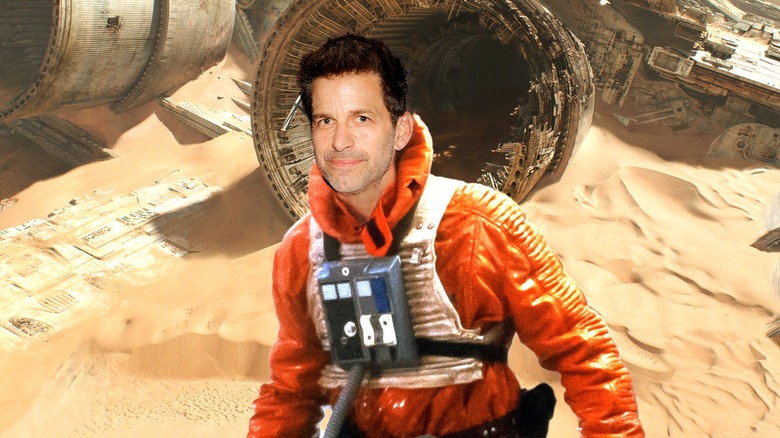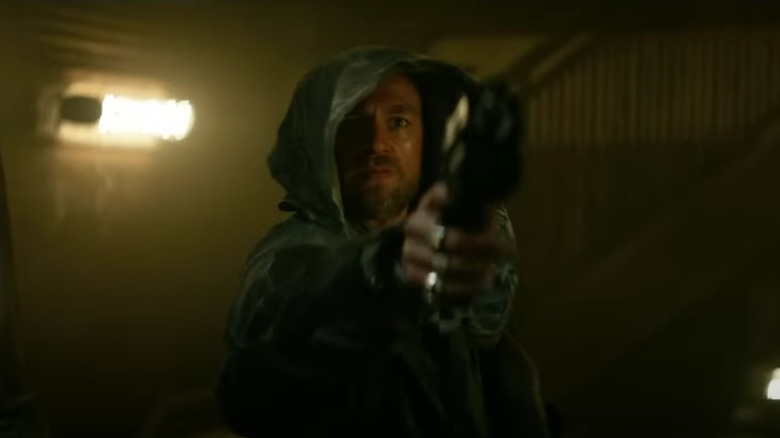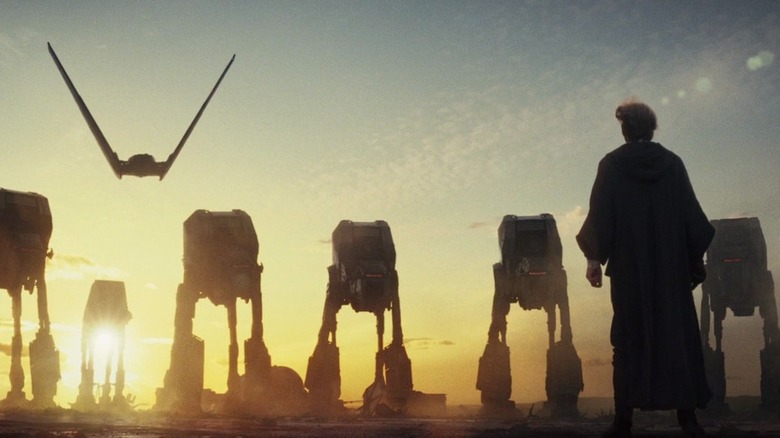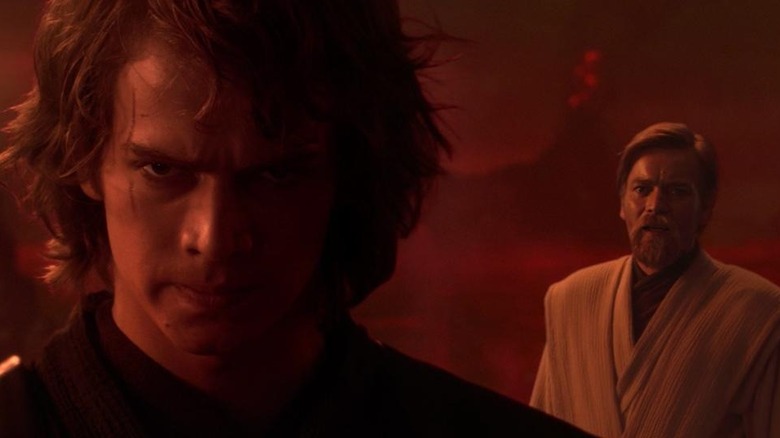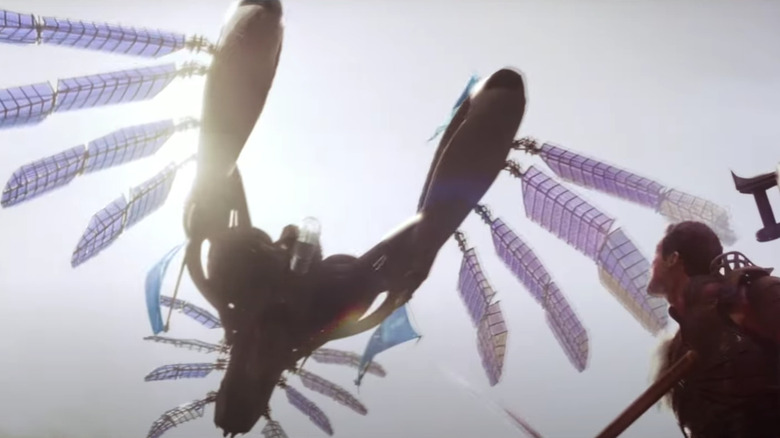Star Wars Is Trapped By Its Past, But Zack Snyder's Rebel Moon Will Break Free
Though "Star Wars" is still a massive franchise, it has undoubtedly lost some of its pop culture cache over the last decade. Whereas any new release used to be a worldwide event, the fact that new TV shows now drop regularly on Disney+ has lessened that effect. As far as movies go, the recent announcement that both Patty Jenkins' and Kevin Feige's "Star Wars" projects have been shelved makes it clear that the future of this cinematic universe isn't going to look beyond the past anytime soon — particularly since, at this point, seemingly every release is set in one prequel time period or another.
For all intents and purposes, the last time "Star Wars" felt like it mattered was with the 2017 sequel "The Last Jedi." While the film notoriously divided the fanbase, it also took big swings and was willing to send a force lightning strike burning through the established canon. Unfortunately, said backlash led Disney to take a much safer approach with the trilogy-ending "The Rise of Skywalker," a film that undid just about everything that Rian Johnson's bold film achieved. Since then, the franchise has had highlights — "The Mandalorian" and "Andor," for example — but even these are limited by the confines of what's worked before.
Meanwhile, Zack Snyder's "Rebel Moon," which itself began as a "Star Wars" project, has emerged as an exciting new universe where anything is possible. Not constrained by nearly five decades of canon and a finicky fanbase that doesn't really know what it wants, the Netflix space opera is free to fly through hyperspace to whatever destination it chooses, and that's going to make this non-"Star Wars" movie into the most exciting "Star Wars"-like project of the decade.
Zack Snyder can take Rebel Moon wherever he wants it to go
Drawing inspiration from the classic works of Akira Kurosawa and George Lucas' venerable science fiction franchise alike, "Rebel Moon" is set to be released on Netflix on December 22, 2023. The film features a stacked cast, including Djimon Hounsou, Ray Fisher, Jena Malone, Charlie Hunnam, Cary Elwes, and Anthony Hopkins. The mood and visuals are pure space opera, and while plot details are minimal at this time, what we do know is that the film will star Sofia Boutella as Kora, a woman with cryptic origins who must journey the galaxy to raise an army capable of taking on the authoritarian powers that threaten them all.
On paper, the closest "Star Wars" comparison with "Rebel Moon" would probably be "Rogue One." Both movies follow an alliance of warriors who are united by their drive to stop the encroaching armies of a burgeoning galactic empire. However, while even the lofty storytelling premise of "Rogue One" was constrained by its connections to the original "Star Wars" trilogy, "Rebel Moon" can use this broad jumping-off point to go pretty much anywhere it wants.
That seems to be precisely what Zack Snyder is hoping for. The filmmaker has said he hopes "Rebel Moon" launches its own franchise that can be continued and expanded upon. Furthermore, coming off of two big wins like the Snyder Cut of "Justice League," and his smash hit zombie flick, "Army of the Dead," it's never been a better time for the director to take such a big swing.
Snyder originally envisioned "Rebel Moon" as a mainline "Star Wars" project. Lucasfilm rejected it in the 2010s, but ironically, losing the "Star Wars" baggage is exactly what will allow Snyder's story to take chances and have an impact.
Star Wars can't make bold changes without riling up its fanbase
"Star Wars: The Last Jedi" was a huge box office success. It was well-received by critics. It answered criticism of "The Force Awakens" by subverting expectations and taking chances with every single plot beat.
And because of the film's bravery, it split audiences like a lightsaber to a limb. While many appreciated the shocking plot twists it initiated and the epic scale of the film, others rejected its dreary take on classic characters like Luke Skywalker (Mark Hamill). Regardless of what side of this divide you're on, what almost everyone can agree on is that the attempt at course-correction we saw in the bland "The Rise of Skywalker" was even worse. Over a half-decade later, we have yet to hear anything about the alleged trilogy of "Star Wars" films planned by "Last Jedi" director Rian Johnson.
By now, "Star Wars" is stuck in a rut. While flashes of brilliance like "Andor" occasionally light the way, most fans can agree that the "Star Wars" franchise needs bold new ideas to escape from the constraints of its tight 75-year timeline. Unfortunately, the only avenues where that seems to be possible are in comics, books, or video games — the avenues that casual "Star Wars" fans follow the least. Meanwhile, Rian Johnson continues to make exciting and inventive new genre films like "Glass Onion."
If Snyder's original "Rebel Moon" plans had taken hold, he likely would've faced the same aggressive response as "The Last Jedi." By separating it from the franchise, "Rebel Moon" will be able to tell new stories, subvert expectations, and surprise audiences without causing the same sort of backlash.
Most Star Wars projects are locked into a specific spot in the timeline
The biggest problem with the current slate of "Star Wars" projects is that it seems like every single one needs to be somehow tied into or take place in-between the confines of the three major film trilogies. Just one aspect that shows how much this is forcing the franchise to continuously spin its wheels is the constant return of dead legacy characters like Obi-Wan Kenobi (Ewan McGregor) and Cassian Andor (Diego Luna). Every major "Star Wars" project right now is filling in the blank spaces of films or TV shows that came before, with no project daring to look at what happens after the ending of "The Rise of Skywalker."
After the big shake-up that "The Last Jedi" did to the fanbase, it looks as if Disney is afraid to deviate from the established formula of its successful TV offerings. Meanwhile, these shows and movies are unable or unwilling to make daring choices, but they must instead be cemented between major moments in the canon — or set far enough away from the central struggles to be seen as somewhat insignificant in the grand scheme of things.
This is why, when compared to the current slate of new and upcoming "Star Wars" projects, "Rebel Moon" is infinitely more exciting to anticipate. While the galaxy far, far away may be content to spin in circles, retreading the past, Zack Snyder's freshly minted franchise is filled with an absolutely endless supply of potential.
To top it off? Just as "Rebel Moon" is a fresh face on Snyder's original "Star Wars" pitch, perhaps the filmmakers' new universe can also be a home for other axed "Star Wars" projects.
Rebel Moon could give a home to canceled or shelved Star Wars projects
While Patty Jenkins' sequel to the massive DC hit, "Wonder Woman," didn't exactly live up to the hype of its predecessor, it's clear from her jaw-dropping efforts with the true crime serial killer drama "Monster," which she both wrote and directed — as well as the original smash-hit "Wonder Woman" — that the filmmaker is capable of doing great things. Meanwhile, Kevin Feige is, of course, widely known as the mastermind behind arguably the biggest franchise in the world, the Marvel Cinematic Universe.
Both of these creators saw their "Star Wars" projects abandoned. However, let's say that Snyder's "Rebel Moon" is a huge success, opening the doors to spin-offs galore. In this hypothetical universe, perhaps elements from the Feige projct, the Jenkins one, or any other canceled "Star Wars" project could be restructured and resurrected in the "Rebel Moon" universe.
Netflix is betting big on Snyder. And with even tepid releases like the Russo brothers' $200 million espionage thriller "The Gray Man" garnering follow-ups from Netflix, it seems likely that Snyder's new universe will be given the chance to grow. And for fans of space operas, there's no question that a swarm of "Rebel Moon" projects is far more exciting than the rut the "Star Wars" franchise has gotten itself into.
